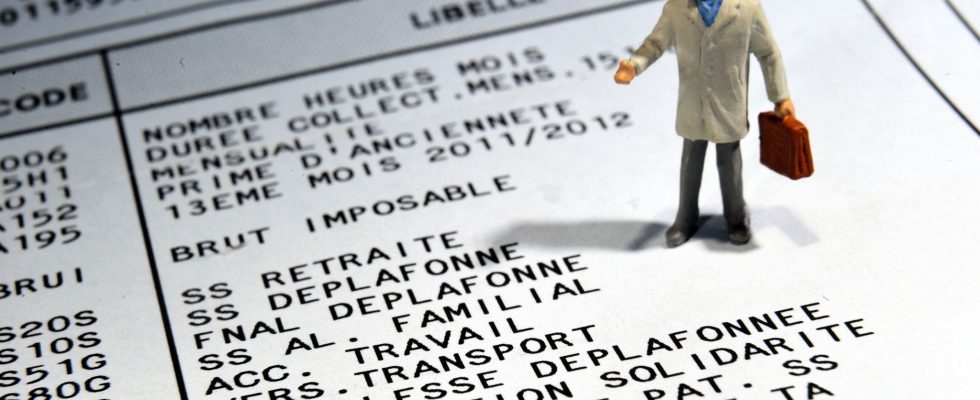The National Assembly is seizing, this Monday, June 26, the bill on the “sharing of value” resulting from a union-employer agreement, which promises new showdowns on “superprofits” and wages. Objective stated by the government: to better distribute the wealth within a company.
After turning the page on pensions, the Minister of Labor Olivier Dussopt returns to the hemicycle from 4 p.m. for this “faithful” transposition text of a national interprofessional agreement (ANI), concluded in February in a context of high inflation. . Just under 400 amendments were tabled to the text.
It plans to extend schemes such as profit-sharing, participation or value-sharing bonuses (PPV or “Macron bonus”) to all companies with more than eleven employees, with VSEs-SMEs lagging behind. It should be noted that participation is a mechanism for redistributing profits, currently compulsory in companies with more than 50 employees, while profit-sharing is an optional bonus linked to non-financial results or performance. These arrangements come with tax benefits.
The value-sharing bonus (PPV), which has replaced the exceptional purchasing power bonus since July 2022, is a system that allows the employer to pay the employee a bonus. The project provides that companies with 11 to 49 employees and which are profitable – whose net profit represents at least 1% of turnover for three consecutive years – set up at least one value-sharing mechanism, for five years of experimentation. In committee, the deputies advanced the entry into force of the obligation by one year, to the beginning of 2024, instead of 2025. Enough to make employers cringe.
Up to €6,000
This is a long-term system that companies can set up each year. The premium remains optional. “Its payment depends on a decision taken by the employer or a company agreement. The conditions for obtaining and tax exemption of this bonus vary according to the date of its payment”, indicates the official site of the French administration. According to Ministry of Economy portalthe maximum amount of the value-sharing bonus will be 3,000 euros per employee and may be increased up to 6,000 euros in certain cases: signature of a profit-sharing agreement, payment by a general interest organization , payment to disabled workers covered by an ESAT.
The debates promise to be animated around the question of “exceptional profits”. The text provides that companies with at least 50 employees will have to negotiate its definition and sharing. The initial copy left it up to employers alone, but the Council of State asked to specify in the law the criteria which determine what is an “exceptional increase in profit”. So the government included this business negotiation. The presidential majority has planned in the hemicycle to re-specify that “the definition of the exceptional increase in profit” will have to take into account the size of the company, its sector, etc. Insufficient for the oppositions, who want more framing and advocate, like the Insoumis, systematic bonuses in the event of “superprofits”.
It is also a question of developing employee share ownership. The agreement was signed by four out of five unions – without the CGT – and is “in line with the reforms since 2017 to upgrade work”, boasts the minister. He pleads for “the balance of the text to be preserved”, urging the deputies to stick to “the agreement, nothing but the agreement”. And Prime Minister Elisabeth Borne, who is seeking to renew social dialogue after the long pension dispute, welcomes: “this bill illustrates what we want to do with the social partners, that is to say let them take the lead” and then translate the agreements into law. But the parliamentarians intend to take their full part, under consideration until Thursday.
The fear of “wage circumvention”
For their part, the LR deputies support the devices of “value sharing”, seen as an “additional remuneration and challenge for employees”. The other oppositions are more dubious, even frankly opposed. At the National Rally, it is feared that the deployment of these devices will be done “to the detriment of the increase in wages, which remains the best sharing of value”. The left also fears a “circumvention of wages” and accuses the government of “not responding in any way to the question of purchasing power”. LFI elected officials will seek to remove what they perceive as “smoke screens” to deceive employees, and the whole of Nupes is pushing for equal pay or “social justice” measures.
Some in the majority are not left out, Emmanuel Macron having himself committed during his campaign to establishing an “employee dividend”, and the boss of the MoDem group Jean-Paul Mattei having raised since the fall the subject of ” super dividends”. Olivier Dussopt warned of “a risk of one-upmanship” and will only defend any modification to the ANI “with a consensus of the signatories”. The text does not attack large companies which devote their “exceptional” income to share buybacks when Emmanuel Macron had asked to think about ways to “benefit” workers. Olivier Dussopt referred a possible measure to the next budget.
